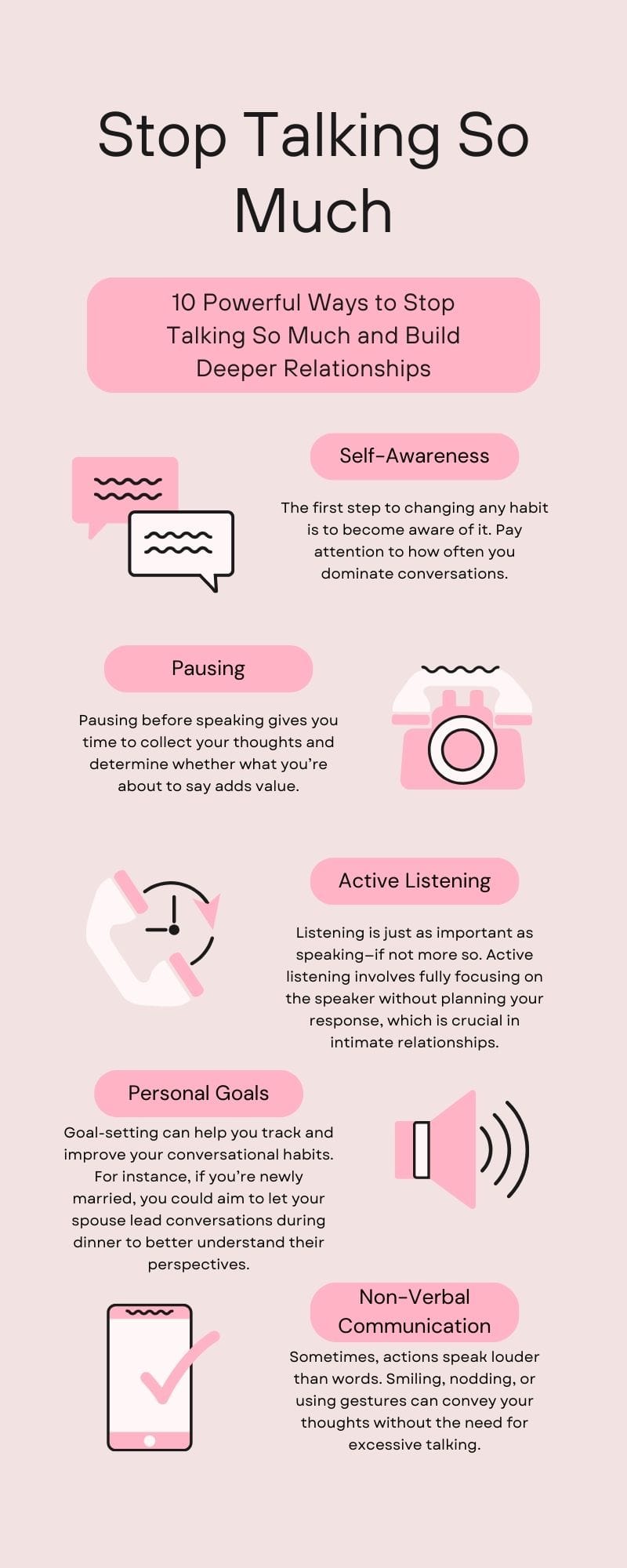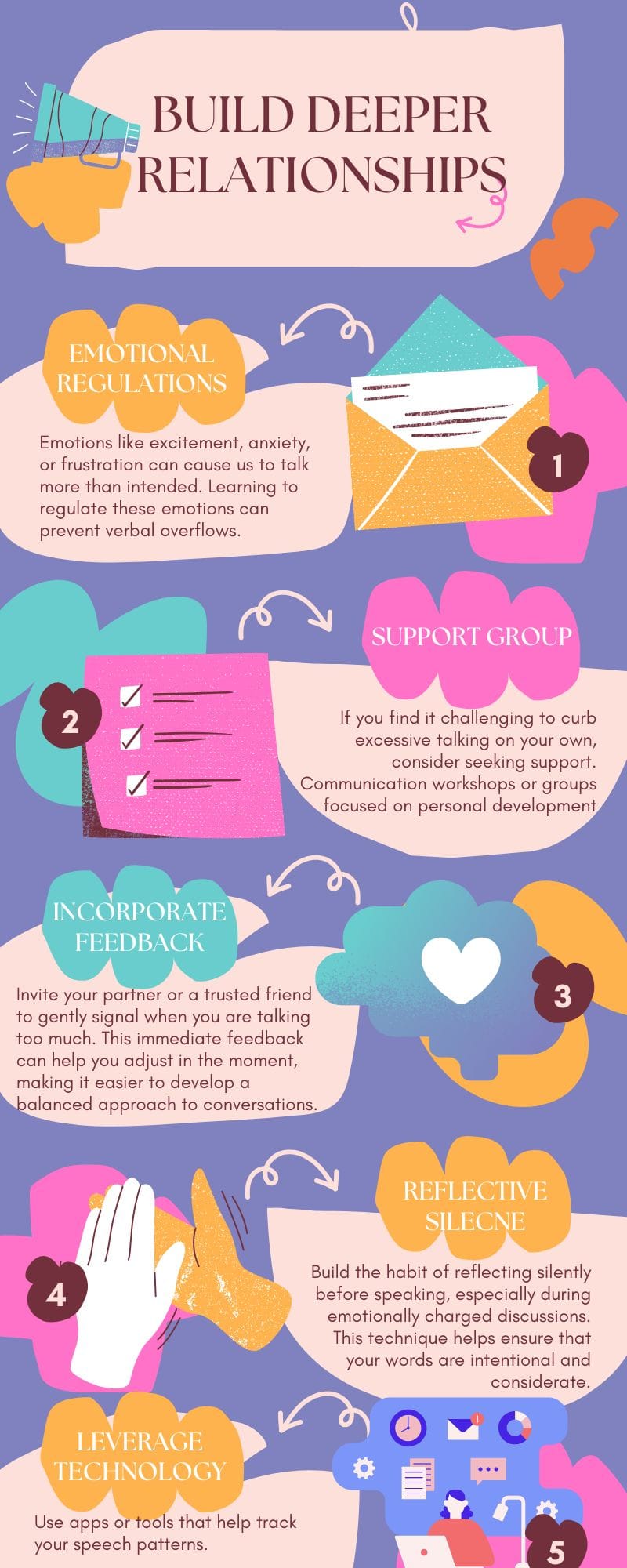Introduction
Effective communication is the foundation of strong relationships. Whether you’re newly married, navigating the complexities of a long-term relationship, or embarking on a new chapter of life, having effective communication is crucial for strengthening the bonds of relationships.
But some people tend to talk so much that they sometimes over-communicate and create hindrances during meaningful conversations. If you’ve ever wondered, “How can I stop talking so much?” or “How to be less talkative?” searching for strategies on “how to stop talking too much or overshare?”, then probably you’re one of the many who are searching solutions for this problem.
Trust Me, you are not alone! I can assure you that many people communicate with others without using any filters and tend to give away too much information than what is required, without even realizing the situation they are in and the place where they are speaking. This guide aims to offer practical solutions to help you communicate effectively and cultivate stronger bonds with your partner, friends, and family.
Excessive Talking – Why Do People Talk Too Much?

Before diving into strategies, it’s essential to understand why some people tend to do excessive talking. Common reasons include:
- Nervousness or anxiety: Some people get so nervous while talking that they rush through their thoughts while talking with someone and cover their key aspects to highlight before they forget.
- Desire to connect: Some people talk more than required in excitement. When they desire to connect with someone, they often over-express themselves.
- Unawareness: Many people are naturally unaware of their habit of talking so much and they hardly notice that it’s impacting their conversations.
- Overcompensation: Some people fear being misunderstood or unheard due to a lack of clarity in the way they communicate with others. This might lead to overexplaining.
While there can be several reasons why people talk too much, however, recognizing the underlying cause of this habit can make it easier for them to improve themselves. For example, newly married couples might talk excessively due to nervousness about making a good impression, while individuals re-entering the dating scene might overcompensate for past misunderstandings.
Is Talking Too Much in a Relationship Bad?
If you’ve just entered a new relationship, it’s important to proceed cautiously to make a good impression. You wouldn’t want to overexpress yourself without fully understanding your partner. It’s equally important to recognize that you might not yet know your partner’s true behavior, and speaking excessively without this understanding could negatively impact your relationship.
I would say stop talking so much in a relationship because it can lead to:
- Confusion and Misunderstanding: Talking excessively can lead to a lot of confusion and misunderstandings. In haste, you might say things you didn’t intend to, and your partner could interpret them in a completely different context, one that you never meant.
- Others Take Advantage: The things you say can later be used against you during an argument, often in a way that misrepresents what you actually meant or never even said.
- Irritation: Sometimes, talking too much can irritate your partner, and in their irritation, they may stop enjoying or even wanting to listen to what you have to say.
- Hurting Others: Speaking excessively without thinking can sometimes hurt the other person. You might unintentionally say something that offends your partner or hurts their feelings.
- Lack of Trustworthiness: Your partner may start trusting you less if they feel you can’t keep things confidential. Fearing that you might share anything anywhere, they might begin hiding things from you.
- Feeling Neglected: In your eagerness to express yourself, you might unintentionally overlook listening to your partner’s views. This could make them feel neglected and even give them the impression that you don’t value what they have to say.
- Wastage of Time: Talking excessively can waste both your time and the other person’s time. People often prefer getting straight to the point rather than beating around the bush. This not only saves time but also makes it easier for both of you to understand each other’s thoughts clearly and efficiently.

1. Cultivate Self-Awareness
The first step to changing any habit is to become aware of it. Pay attention to how often you dominate conversations and over-communicate than what is required. For example, during a discussion with your partner, do you interrupt their thoughts or ramble without leaving room for them to contribute?
Tips to Build Awareness:
- Keep a journal: Note down triggers and outcomes, and think about what caused you to talk so much.
- Ask for feedback: As for constructive feedback and insights from trusted friends, partners, or even professional counselors.
- Practice mindfulness: Be present during conversations and develop a habit of listening and understanding other’s views.
2. Embrace the Power of Pausing
Pause and think before speaking, it gives you time to collect your thoughts and determine whether what you’re about to say will lead to a constructive conversation or not.
Strategies for Effective Pausing:
- Develop a habit: Develop a habit of pausing before responding.
- Use active listening cues: Instead of filling silences, nod or smile to show engagement.
- Develop Understanding: Pause and utilize this time to develop an understanding of the conversation.
Expert Insight: Pausing not only helps you understand the conversation better but you appear to be more thoughtful and it also allows others the space to contribute. This balance can foster deeper, more meaningful conversations—especially in relationships where both partners value equal participation.
3. Practice Active Listening
Listening is just as important as speaking—if not more so. Active listening involves fully focusing on the speaker without planning your response, which is crucial in strengthening bonds, particularly in intimate relationships.
How to Improve Your Listening Skills:
- Maintain eye contact: Show genuine interest in what the other person is saying.
- Summarize: Reflect back on what you heard, e.g., “So, you’re saying…”
- Ask open-ended questions: Encourage the other person to elaborate by asking questions like, “How did that make you feel?”
For instance, in a marriage or new relationship, asking your partner about their views and genuinely listening can strengthen your emotional connection.
4. Set Personal Goals
Goal-setting can help you track and improve your conversational habits. For instance, set a goal to allow others to lead the conversation in the beginning. For example, if you’re newly married, you could aim to let your spouse lead conversations during dinner to better understand their perspectives.
Examples of Goals:
- Allow others to lead the conversation.
- Develop a habit of pausing for 3 seconds before you speak.
- Ask thoughtful questions before concluding.
Expert Insight: Each goal should have small milestones. Celebrating small wins can help you gain more control over your excessive talking habits and build resilience.
5. Use Non-Verbal Communication
Sometimes, actions speak louder than words. Smiling, nodding, or using gestures can convey your thoughts without the need for excessive talking.
Benefits of Non-Verbal Cues:
- They show you’re engaged without interrupting.
- They allow the conversation to flow naturally.
- They help you stay connected even during moments of silence.
For example, during a family gathering, using non-verbal cues like a warm smile can communicate attentiveness without overwhelming the conversation.

6. Develop Emotional Regulation Skills
Emotions like excitement, anxiety, or frustration can cause us to talk too much more than intended. Learning to control these emotions can prevent verbal overflows.
Techniques for Emotional Regulation:
- Deep breathing: Take slow, deep breaths to calm your nerves.
- Mindfulness meditation: Regular practice can improve emotional control.
- Cognitive reframing: Shift your mindset from “I must explain everything” to “It’s okay to let others lead.”
For individuals navigating separation or divorce, emotional regulation can help manage the urge to overexplain or dominate conversations during sensitive discussions.
Also Read: Self-control is Strength. Calmness is Mastery. You – Tymoff – 10 Powerful Reasons
7. Join a Support Group or Workshop
If you find it challenging to curb excessive talking on your own, consider seeking support. Communication workshops or groups focused on personal development can provide practical tools and accountability.
Resources to Explore:
- Toastmasters International: Develop concise communication skills.
- Therapeutic groups: Address underlying issues like anxiety or low self-esteem.
Unique Insight: Structured settings, like workshops, can simulate real-life scenarios, helping you practice concise and impactful communication. In both the United States and India, organizations like Toastmasters or local therapy groups provide valuable platforms for developing these skills. For individuals in the U.S. or India, local Toastmasters or therapy groups can be valuable resources.
8. Incorporate Feedback in Real Time
Invite your partner or a trusted friend to gently signal when you are talking too much. This immediate feedback can help you adjust in the moment, making it easier to develop a balanced approach to conversations. Tell people beforehand to give some sort of signal that can make you understand that you are talking too much than required.
9. Practice Reflective Silence
Build the habit of reflecting silently before speaking, especially during emotionally charged discussions. This technique helps ensure that your words are intentional and considerate. When in silence recollect the crux of the conversation and respond with what is relevant and necessary instead.
10. Leverage Technology for Improvement
Use apps or tools that help you record conversations that went off-topic. Listening to those recordings can help you understand where you went off the topic and what triggers led you to react in a certain way that led to unexpected outcomes. It’s always better to inform your partner about these recordings so that it doesn’t create any misunderstandings in the future.
How To Be Less Talkative – Develop Habits
Even with the best intentions, it’s easy to fall back into old habits. Here are a few habits to develop to be less talkative:
- Practice Meditation: To curb nervousness and anxiety, practice meditation to improve your focus.
- Stop Overthinking: Stop creating imaginary scenarios and embrace moments of quiet instead of rushing to fill them.
- Don’t Cover Up: Stop filling up sentences and creating new dimensions to the conversation. Don’t rush while speaking your views.
Focus: Shift your mindset from “What should I say next?” to “How can I make this person feel heard?”
FAQs on Talking Too Much
Q: How do I know if I’m talking too much?
A: Common signs include frequently interrupting others, monopolizing conversations, or receiving feedback that you dominate discussions.
Q: Can talking too much harm relationships?
A: Yes. Over-talking can make others feel undervalued or overwhelmed, which may strain your connection.
Q: Is it possible to stop talking so much permanently?
A: Yes, with consistent self-awareness and practice, you can develop a balanced approach to communication.
Conclusion
To conclude, learning how to stop talking so much isn’t about silencing yourself—it’s about finding balance and fostering meaningful dialogue. By actively listening and encouraging others to share, you can create an environment where relationships flourish. By embracing active listening, practicing mindfulness, and seeking feedback, you can transform your communication style and strengthen your relationships. Remember, meaningful conversations are built on mutual respect and understanding.
Ready to take the first step? Start applying these strategies today and experience the joy of deeper, more fulfilling connections. Share this article with your friends or loved ones who might also benefit from these insights! If you found this guide helpful, share it with someone who might benefit!

Greetings! I am the voice behind the thoughts presented on Synched Harmony. As an ordinary individual, I strive to live a life dedicated to achieving inner peace and serenity by cultivating harmony within and making difficult aspects of life work together in sync during tough phases of life. Life becomes much easier if we open ourselves to small changes and respect each other’s personal boundaries, creating space for shared happiness.
